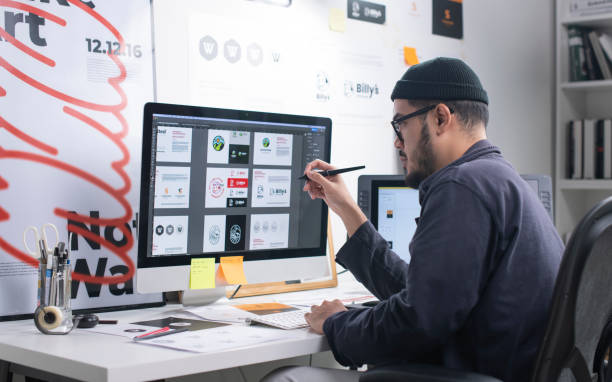ntroduction

Graphic design is a creative field where artists use images, text, and colors to communicate messages. Whether you’re designing a logo, a poster, or a website, graphic design helps you create visuals that are both attractive and meaningful. In this guide, we’ll break down the basics of graphic design and give you some helpful tips to get started.
What is Graphic Design?
Graphic design is the art of creating visuals to send a message. Designers use things like colors, fonts, shapes, and pictures to make designs that are not only eye-catching but also easy to understand. It’s used in everything from logos and websites to advertisements and social media posts.
Key Principles of Graphic Design
- Contrast
Contrast helps make important elements stand out in a design. By using different colors or sizes, you can grab the viewer’s attention. - Balance
Balance in design makes everything feel even and stable. A well-balanced design is pleasing to look at and doesn’t feel too crowded or empty. - Alignment
Alignment is about arranging elements in a way that they look organized and neat. Proper alignment makes your design more professional and easy to follow. - Repetition
Repetition is when you use the same colors, fonts, or shapes throughout a design. It creates consistency and ties everything together. - Proximity
Proximity means grouping related items together. When things are close to each other, it helps viewers understand that they are connected.
Tools for Graphic Design
Graphic designers use many different tools to create their designs. Here are a few of the most popular ones:
- Adobe Photoshop
Photoshop is great for editing photos and creating detailed images. It’s often used for digital art and photo manipulation. - Adobe Illustrator
Illustrator is used to create vector graphics, like logos and icons, that can be resized without losing quality. - Canva
Canva is an easy-to-use tool perfect for beginners. It offers templates for making things like social media posts and presentations. - CorelDRAW
CorelDRAW is another tool for creating vector graphics. It’s used for designing things like logos and brochures. - Sketch
Sketch is a design tool mainly used for creating websites and mobile apps. It’s simple to use and great for designing user interfaces.
Tips for Beginners in Graphic Design
- Keep It Simple
If you’re new to graphic design, start simple. Focus on learning the basics first and avoid making things too complicated. - Use a Grid
A grid helps you organize your design. It makes sure everything is lined up properly and looks balanced. - Choose Colors Carefully
Colors play a big role in design. Pick colors that match the mood of your project and create a pleasant look. - Learn Typography
Typography is about choosing the right fonts. The font you choose should be easy to read and fit with the overall design. - Practice, Practice, Practice
The more you practice, the better you’ll get at graphic design. Look for inspiration from other designers and try new things.
Graphic Design Trends
Graphic design is always changing. Here are some trends that are popular right now:
- Minimalism
Minimalism means keeping things simple. Many designs today use fewer elements to create a clean, modern look. - Flat Design
Flat design uses simple, two-dimensional shapes and no shadows. It’s often used for websites and mobile apps because it looks sleek and modern. - Custom Illustrations
More brands are using custom illustrations instead of stock images. These designs help make a brand stand out. - Gradients
Gradients, which are smooth blends of colors, are making a comeback. They add depth and style to designs. - Bold Fonts
Bold typography is used to make strong statements. Large, bold text can grab attention and add energy to a design.
Conclusion
Graphic design is an exciting way to communicate through visuals. By understanding the key principles of design, learning the right tools, and following helpful tips, you can create designs that are both beautiful and effective. Whether you’re just starting or you’ve been designing for years, practicing and staying updated on the latest trends will help you improve your skills and stay ahead.